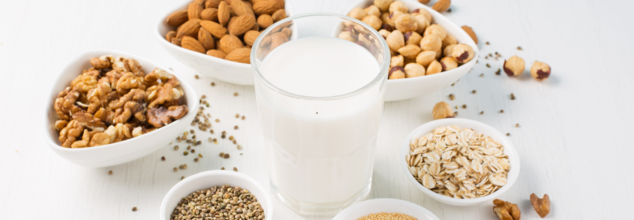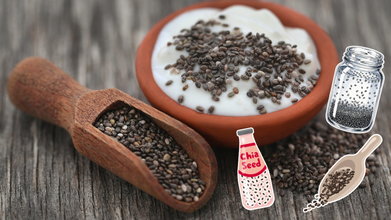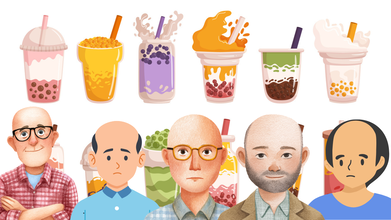- Health Conditions A-Z
- Health & Wellness
- Nutrition
- Fitness
- Health News
- Ayurveda
- Videos
- Medicine A-Z
- Parenting
5 Cow’s Milk Substitutes—And What To Look For Before You Buy

Credits: Canva
Cow’s milk is a popular dietary staple known for its protein, calcium, phosphorus, and B vitamins. Yet, for many individuals, it isn’t suitable. People may need or choose to avoid it due to allergies, lactose intolerance, vegan lifestyles, or concerns about hormones and contaminants. Fortunately, the market now offers a range of plant-based milk alternatives—but not all are nutritionally equal. When choosing a milk substitute, it’s important to look beyond just taste and texture.
Experts advise checking the label for added sugars, calcium and vitamin D fortification, protein content, and the percentage of the key ingredient (like almonds or oats). Here’s a closer look at five common substitutes for cow’s milk and how to pick the best ones for your needs.
Soy Milk
Soy milk, made from soybeans or soy protein isolate, is one of the most nutritionally comparable alternatives to cow’s milk. It typically contains 7–9 grams of protein per cup, which is similar to cow’s milk, and fewer calories and carbohydrates. Because it’s a complete protein source, it provides all essential amino acids, a rarity among plant-based options.
However, some individuals avoid soy due to the presence of isoflavones—compounds that mimic estrogen—which have been debated for their hormonal effects. While current research does not confirm harm from moderate consumption, those with specific hormonal conditions may prefer to consult a healthcare provider.
Soy milk can be a good option for cooking and drinking, but for people following a low-FODMAP diet, it’s best to choose versions made from soy protein isolate rather than whole soybeans, which can cause digestive discomfort.
What to check: Look for fortified soy milk with calcium and vitamin D. If you’re concerned about GMOs, opt for organic versions.
Almond Milk
This nut-based milk alternative has surged in popularity due to its light, slightly sweet flavor and low calorie content. Unsweetened almond milk typically contains just 30–35 calories per cup. However, it only provides about 1 gram of protein, making it less ideal for those needing higher protein intake.
One downside is that most commercial almond milk contains only 2% almonds, meaning the drink is mostly water and may not offer the full nutritional benefits of whole almonds. Additionally, it contains phytic acid, which can inhibit the absorption of calcium, zinc, and iron.
What to check: Look for almond milk with higher nut content (around 7–15%), and avoid sweetened versions to reduce unnecessary sugar intake.
Coconut Milk
Coconut milk is made from the white flesh of coconuts blended with water. It has a creamy consistency and a mild, sweet flavor. With about 45 calories per cup, it is low in carbohydrates and protein, and most of its calories come from saturated fat in the form of medium-chain triglycerides (MCTs).
MCTs have been linked to potential benefits such as appetite regulation and better cholesterol profiles. Still, due to limited research and its high saturated fat content, coconut milk should be consumed in moderation as part of a balanced diet.
What to check: Choose unsweetened versions and consider your overall fat intake, especially if you're managing cholesterol or heart health.
Oat Milk
Made from oats and water, oat milk has become a favorite for its naturally sweet flavor and creamy texture. It blends well in coffee, cereal, and smoothies. Nutritionally, it’s higher in carbohydrates (19–29 grams per cup) than other plant-based milks but also provides more fiber—particularly beta-glucan, which is known to help lower LDL cholesterol.
It has 2.5–5 grams of protein and around 140–170 calories per cup. Because of its carbohydrate content, it may not suit low-carb diets but can be a satisfying option for those needing more energy or managing cholesterol levels.
What to check: Look for fortified oat milk without added sugars. For homemade versions, it’s difficult to match the nutrient levels of commercial fortified options.
Rice Milk
Rice milk, derived from milled rice and water, is the most hypoallergenic of the milk alternatives, making it suitable for those with allergies to dairy, soy, nuts, or gluten. It has a thin consistency and naturally sweet taste but is high in carbohydrates (27–38 grams per cup) and low in protein (1 gram per cup).
Its high glycemic index means it’s quickly absorbed, which can cause blood sugar spikes—making it a less ideal choice for people with diabetes. Moreover, rice milk can contain higher levels of inorganic arsenic, so health experts recommend varying grain sources in your diet.
What to check: Use rice milk occasionally, especially for children or those who consume large amounts of rice products. Choose brands that test and limit arsenic content.
Have You Also Noticed Suddenly Becoming Lactose Intolerant? Nutritionist Explains Why

Credits: iStock
Have you been drinking milk all your life and suddenly your gut cannot tolerate it? Are you also finding out that you are suddenly lactose intolerant, and trying to find the reason? Nutritionist Sonia Narang might have the answer.
In a podcast with Raj Shamani, Narang decodes Indian diet and its benefits and risks, if not consumed correctly. This is when Raj Shamani throws the question of lactose intolerance, especially when someone like him has been drinking milk since childhood and can no longer tolerate it.
Also Read: Fact Check: Is Weight Lifting Safe for Teens? An Expert Explains the Risks and Safer Alternatives
What Does The Expert Say About Sudden Lactose Intolerance?
Narang first explains what lactose is and how it works in one's body. She starts with explaining lactase, which is a sugar found in milk, and digested by lactase, an enzyme found in small intestine.
She then explains that in small intestine, there are brush like formations, called villi, which further have smaller brush called microvilli. This is where lactase is made. This is what helps the breakdown of lactose.
However, she explains, overtime, whether due to age, or infection, lifestyle, bad food choices, the ability of microvilli to produce lactase decreases. She points out that as kids, the production of lactase is enough, due to less exposure to bad food choices.
Can You Reverse Lactose Intolerance?
Lactose intolerance is not an allergy. There are ways to manage or improve lactose intolerance. Narang says that the first step is to eliminate milk completely, and then start with having curd as alternative. "While curd is a dairy product, it already has bacteria that makes it pre-digested," she points out.
She also recommends to slowly introduce milk, "just two spoons between the meals". Since milk is consumed with food, it will digest slowly and by the time it reaches the intestine, small intestine will get the time to produce enough amounts of lactase to digest two spoons of milk, she points out.
Read: 5 Cow’s Milk Substitutes—And What To Look For Before You Buy
What Is Lactose Intolerance?
As per the NHS, UK, lactose intolerance is when you get symptoms like stomach ache after eating food containing lactose, a sugar found in dairy products.
What Are The Common Symptoms Of Lactose Intolerance?
- tummy pain or discomfort
- bloating
- farting
- tummy rumbling
- diarrhea or constipation
- feeling sick or being sick
What Foods Contain Lactose?
Dairy products include:
- milk
- butter
- cheese
- cream
- yoghurt
- ice cream
Many processed foods can also contain lactose, including:
- cereals
- baked foods like bread, crackers, cakes, biscuits, and pastry
- sauces and salad dressings
- diet and protein shakes
Note: Health and Me does not promote any changes to be made in your diet. Always consult your nutritionist or dietitian and your doctor before changing your diet. This piece is based on publicly available content.
Superfood Chia Seeds Can Also Be Risky For Some, Know Who They Are

Credits: iStock/Canva
Chia seeds, a superfood as we all know and have a number of benefits, however, if not taken properly, it can increase risks and could worsen your health, says Dr Shubham Vatsya, a gastroenterologist, and hepatologist at Fortis Vasant Kunj. He is known for making health related content on his Instagram page, targeting foods and habits that impact gut health, liver, and more.
In one of the videos which garnered over one million views, he talks about the risk of chia seeds. The video is titled 'Chia Seeds Are Not For Everyone".
What Are The Risks Of Consuming Chia Seeds?
Dr Vatsya points out that if chia seeds are consumed without knowing how your body works and without proper hydration, it could worsen your health.
Talking about who should be more careful before making chia seeds part of their diets? He gives four instances:
People With Low Blood Pressure Should Avoid Chia Seeds
He says many people, especially many women have low blood pressure and they may have included chia seeds in their diet without knowing much about it. Why does this happen? Chia seeds contain quercetin, which is an antioxidant and it could reduce your risk of several health condition, including heart diseases. However, points out Dr Vatsya, it is high in fiber, which could further lower your blood pressure. If you already have a low blood pressure, this could cause you a health risk.
People Who Are On Blood Thinning Medicines Should Avoid Chia Seeds
Doctor says that people who are on blood thinning medicines like aspirin, especially after a heart stent, may be at risk. Why? Because chia seeds can have a blood thinning effect due to its omega-3 fatty acids content. This can increase bleeding risk. So, people on prescription blood thinners or anticoagulants like warfarin or aspirin, must avoid it.
Hydration Is Must
Chia seeds are high in fiber, which is why it is important to maintain enough hydration. What happens if you do not keep yourself hydrated enough?
Chia Seeds Could Upset Your Stomach
While getting enough fiber helps prevent and manage constipation, however, the doctor points out consuming significant amounts of fiber can cause digestive issues like gas, bloating, and abdominal pain, if not hydrated.
Hydration is the key, this is what supports bowel movement regularity and prevent any adverse effects. Furthermore, one should always add fiber to their diet in small amounts and gradually.
Read: Hair Loss In Men: Is It Related To Sweetened Drinks?
Chia Seeds Could Worsen Your Kidney Problem
Lastly, the doctor says that while chia seeds are healthy, but individuals with chronic kidney disease must be careful while consuming.
Chia seeds are rich in potassium and phosphorous. In per 2.5 tablespoon of serving, it contains 115 mg of potassium and 244 mg of phosphorous. Both these nutrients are closely monitored in people with kidney disease. Chia seeds are also high in oxalate, which can attach to calcium to form kidney stones. This is why it is important to maintain your hydration while consuming chia seeds.
Note: This is a user-generated content via Dr. Shubham Vatsya. Health and Me does not take responsibility of the content. Always consult a registered nutritionist or dietitian and your doctor before making changes to your diet.
Hair Loss In Men: Is It Related To Sweetened Drinks?

Credits: iStock/Canva
Hair loss in men is often blamed on genetics, age, or stress. But as lifestyle-linked health problems grow, doctors are taking a closer look at everyday dietary habits, including the regular consumption of sugar-sweetened beverages. While these drinks are not a direct cause of baldness, emerging evidence suggests they may quietly worsen hair loss in men who are already genetically predisposed.
“Hair loss is rarely caused by a single factor,” says Dr. Vineet Malhotra, Head of Urology and Director at VNA Hospital. “But excessive sugar intake can act as an important trigger, especially in men prone to androgenetic alopecia.”
How Sugary Drinks Disrupt Hormones Linked to Hair Loss
Sugar-sweetened beverages such as sodas, packaged fruit juices, energy drinks, and sweetened teas cause a rapid spike in blood glucose levels. To manage this surge, the body releases insulin. When this happens repeatedly over time, it can lead to insulin resistance.
“Chronic insulin resistance is known to disturb hormonal balance,” explains Dr. Malhotra. “It can increase circulating androgens and speed up the conversion of testosterone into dihydrotestosterone, or DHT.”
DHT is the hormone most strongly associated with male pattern baldness. Higher levels of DHT cause hair follicles to shrink, shorten the hair growth cycle, and gradually turn thick hair into finer, weaker strands.
The Inflammation Link: Why the Scalp Suffers
High sugar intake is also closely tied to low-grade systemic inflammation. While this inflammation may not be immediately noticeable, it affects blood vessels throughout the body, including the tiny capillaries that supply oxygen and nutrients to hair follicles.
“When microcirculation is compromised, follicles do not receive adequate nourishment,” says Dr. Malhotra. “This can slow hair growth and increase hair shedding.”
Inflammation can also push hair follicles out of the growth phase and into the resting phase prematurely. The result is often diffuse thinning rather than patchy bald spots, something many men notice before visible hair loss becomes obvious.
Metabolic Health, Gut Health, and Nutrient Deficiencies
Frequent consumption of sugary drinks is linked to weight gain, fatty liver, and metabolic syndrome, all of which can disrupt hormonal balance. Poor metabolic health can alter cortisol levels and insulin-like growth factors, both of which influence how hair follicles function.
Equally important is what high-sugar diets tend to replace. “Men who consume a lot of sugary drinks often miss out on nutrient-dense foods,” Dr. Malhotra notes. This increases the risk of deficiencies in zinc, iron, biotin, protein, and other nutrients essential for healthy hair structure and growth.
What Studies Are Showing So Far
Recent observational studies have found a higher prevalence of early-onset hair loss in young men who consume sugar-sweetened beverages daily compared to those who drink them occasionally. While these studies do not prove a direct cause-and-effect relationship, the association is strong enough to raise concern.
“The impact appears more pronounced in men with a family history of baldness,” says Dr. Malhotra. “In such cases, diet may accelerate hair loss rather than initiate it.”
Sugar Is Not the Only Culprit, But It Matters
It is important to note that sugary drinks alone do not cause hair loss. However, when combined with genetic susceptibility, high stress, poor sleep, smoking, and physical inactivity, excessive sugar intake can significantly worsen scalp health and hair thinning.
Reducing sugar-sweetened beverages, improving overall diet quality, maintaining stable blood sugar levels, and supporting metabolic health may help slow hair loss and promote healthier hair over time.
Why Doctors Are Now Asking About Diet
In clinical practice, men presenting with unexplained or rapidly worsening hair loss are increasingly being asked about their dietary habits, alongside hormonal and nutritional evaluations.
“Cutting back on sugar-sweetened drinks benefits the heart and metabolism,” Dr. Malhotra says. “But it may also offer long-term support for hair health, especially in men at risk of early hair loss.”
While genetics may set the stage, everyday choices often decide how quickly the story unfolds.
© 2024 Bennett, Coleman & Company Limited

